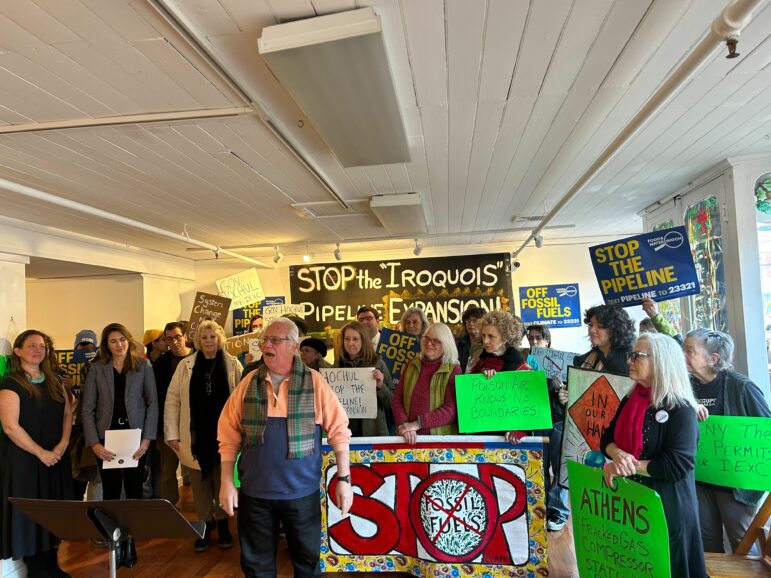The Iroquois Pipeline Operating Company’s proposal is the latest fossil-fueled infrastructure project to earn the ire of local environmental groups, who say such investments are at odds with the goals of New York’s Climate Leadership and Protection Act.

Courtesy of Food & Water Watch
Environmental groups and residents at a rally Tuesday in Athens, NY, urging the state to deny a permit to the Iroquois Pipeline Operating Company.Fifty New York legislators signed a letter delivered to Gov. Kathy Hochul on Tuesday demanding that she stop the Iroquois Pipeline Operating Company from boosting the capacity of its 30-year-old fracked gas pipeline, which runs from Canada to New York City.
The expansion project will enhance four of the pipelines’ compressor stations—which help push the flow of gas through its pipes—and increase the fossil fuel’s supply to the Big Apple by November 2025. In total, the project aims to add 125 million cubic feet per day of natural gas to its existing infrastructure, to be distributed by utilities like National Grid and Con Edison.
“Black and brown communities have already suffered the effects of having [a pipeline] like this exist so close to the poorest parts of our communities,” said Claire Cousin who signed the letter and sits on a county board in Hudson, New York. “We’re tired of fossil fuel industries lining their pockets and profiting off of the pain and unwellness of folks that are directly impacted by these projects.”
The expansion is the latest fossil-fueled infrastructure project to earn the ire of local environmental groups, who say such investments are at odds with the goals of New York’s Climate Leadership and Protection Act. Passed in the summer of 2019, the law sets benchmarks for the state to reduce 85 percent of its greenhouse gas emissions below 1990 levels by 2050.
“New York is a model for what Climate action should look like, and the Iroquois Pipeline Company’s plan to increase fossil fuel infrastructure is misaligned with the climate goals we have enshrined in State Law,” State Senator Michelle Hinchey, one of the signatories on the opposition letter, said in an emailed statement.
According to the non-profit Food & Water Watch, compressor stations emit cancer-causing chemicals like nitrogen oxide (NOx), fine particulate matter, carbon monoxide, benzene, and formaldehyde.
“If you care about your own health, the safety and the health of your residents and your neighbors then this expansion of the Iroquois pipeline should simply not be allowed,” said filmmaker Lisa Thomas at a rally Tuesday in Athens, NY, where lawmakers and environmentalists were opposing the plan. A 22-year resident of Athens, Thomas lives two miles away from one of the compressor stations the company hopes to expand.
Fracked gas, critics say, also releases greenhouse gasses that bring about climate change, including a powerful pollutant known as methane. A recent report by the Environmental Defense Fund found that U.S. natural gas pipelines are leaking between 1.2 million and 2.6 million tons of methane per year.
While the Iroquois Pipeline Operating Company did not respond to City Limits’ request for comment by press time, its brochure for the project pledges it “will be subject to an extensive environmental review as part of the regulatory process.”
It will seek to reduce “overall emissions at project sites,” through the use of specialized turbines and methane recovery systems, according to the company. “We are dedicated to preserving our environment by seeking ways to minimize intrusions to, and maximize protection of, our natural resources,” the brochure reads.
Iroquois Pipeline Operating Company’s expansion application was approved by the Federal Energy Regulatory Commission on the national level.
But since two of the four compressor stations that will be enhanced are located in New York—one in the city of Dover and the other in Athens—the company must apply for state permits to move ahead with plans for each. Right now, the company is awaiting approval of the Article 19 State Air Facility Permit, issued by New York’s Department of Environmental Conservation to all companies that emit air pollutants.
Environmental groups are urging Hochul to put pressure on the DEC to refuse the permit. In a public comment period that ended in February, over 3,000 people spoke out asking for the permit to be denied, according to Food & Water Watch.
Environmentalists say investing in the expansion of fossil fuel infrastructure will merely accelerate climate change, as natural gas consists mostly of the potent methane. Methane has more than 80 times the warming power of carbon dioxide over the first 20 years after it reaches the atmosphere.
“New Yorkers are already seeing the effects of climate change from deadly flooding to extreme heat. So Governor Hochul needs to move off fossil fuels, not expand fracked gas this late in the game,” said Emily Skydel, Hudson Valley senior organizer at Food & Water Watch.
Michael Richardson, an activist from the Hudson Valley who has been opposing the pipeline’s expansion since the plans were announced three years ago, echoed that sentiment.
“Why are we building infrastructure and investing good money into putting more gas through the system when New York State’s climate act says that we have to go the opposite direction?” Richardson said.
Gov. Hochul’s office did not immediately respond to City Limits’ request for comment.
To reach the reporter behind this story, contact Mariana@citylimits.org. To reach the editor, contact Jeanmarie@citylimits.org








